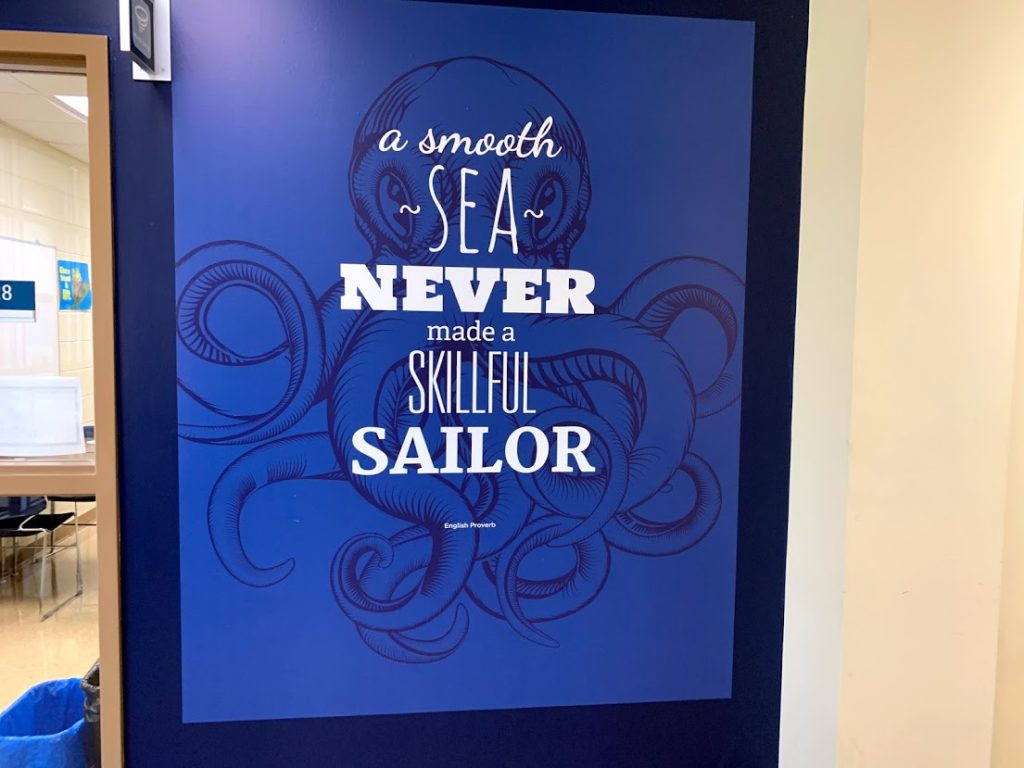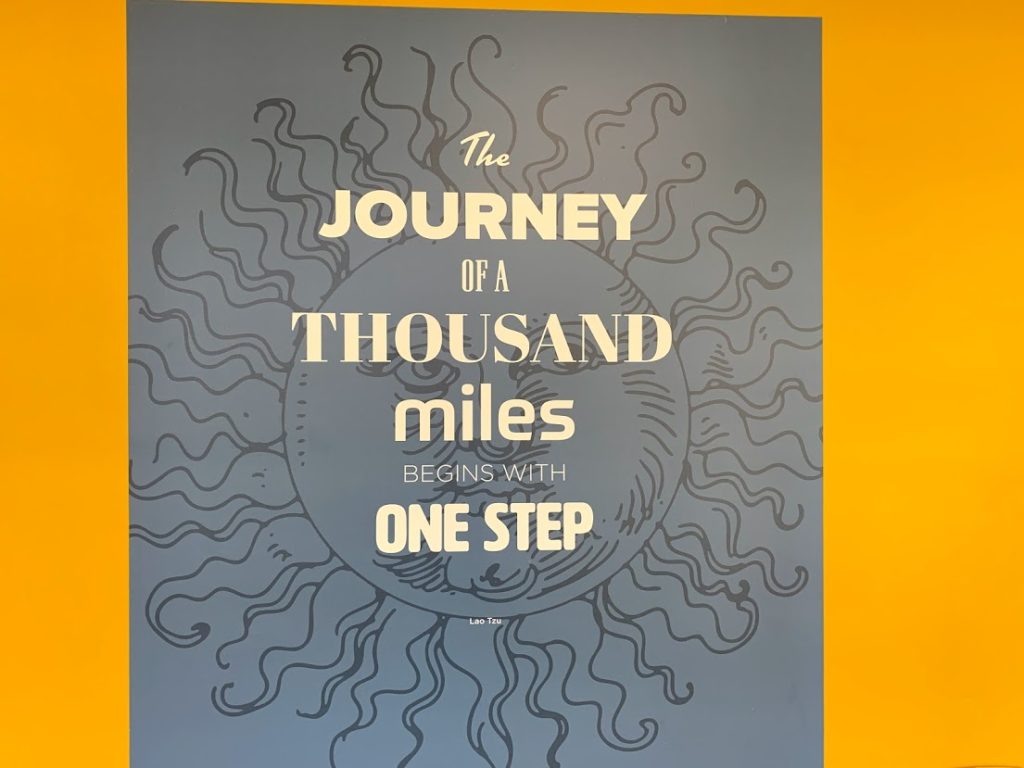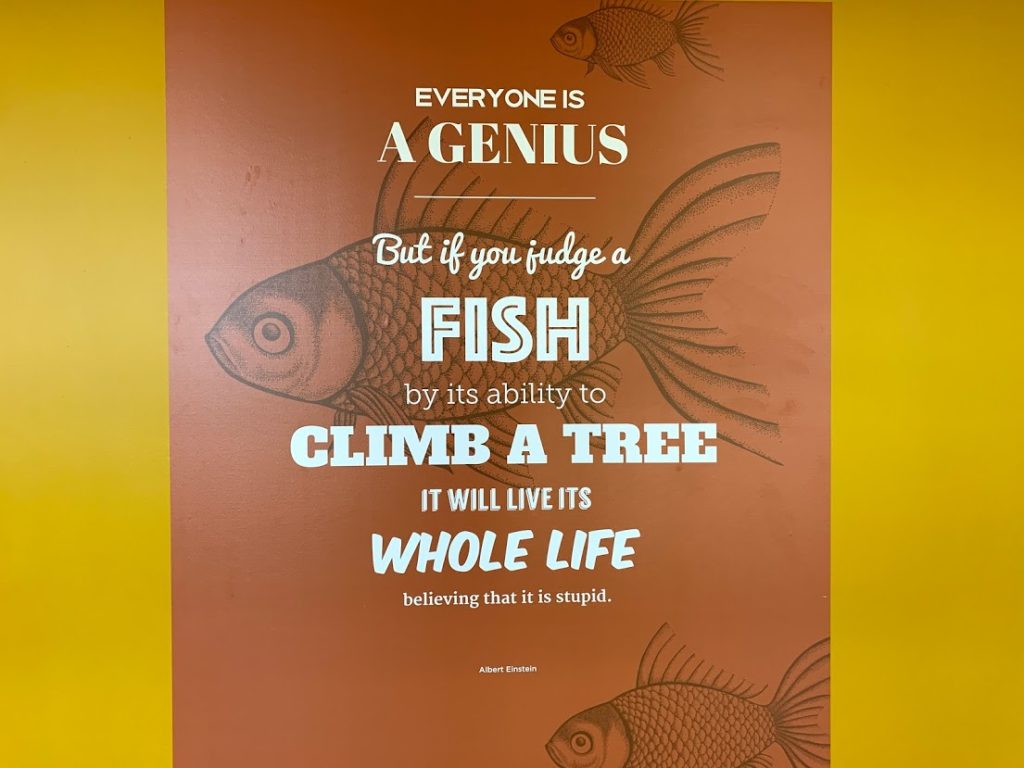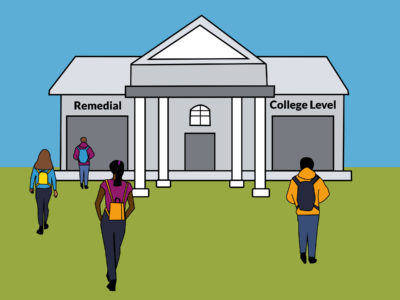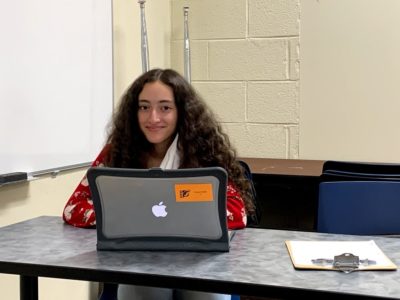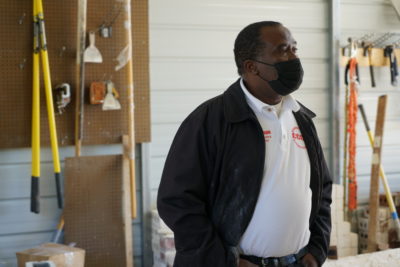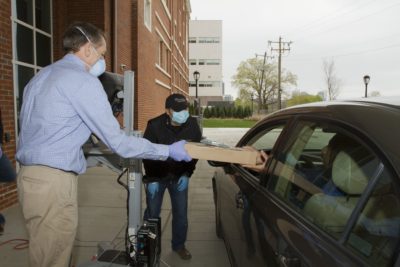This is part of a series on developmental education in North Carolina. Click here to read the rest of the series.
After arriving at Davidson-Davie Community College (formerly Davidson County Community College) three years ago, Sandy Tucker, an adjunct English instructor, saw an opportunity to help connect students to their work in a unique way. “What we were missing in our program was the celebration part of writing,” she said.
In 2019, Tucker developed Coffee House, a program designed to celebrate student success through the presentation of student essays in a unique coffee house setting. Each semester, students in transition English, a developmental course designed to prepare students for college-level English classes, gather on Davidson-Davie Community College’s (DDCC) campus in a room revamped to feel like a coffee house. With tall tables, lowered lights, coffee, snacks, and a microphone, students take to the mic to share their writings, most of which are essays written during their transition English class.
“What these students were willing to put out there was incredible. There was a woman who read her essay about losing a baby, and another shared her story of being an addict. It was magnificent,” said Tucker.
But it isn’t just sharing for the sake of sharing. “This celebration of a student’s work gives significance and respect for the writer, their thoughts and beliefs, and their hard work,” said Tucker. And the recognition of their hard work and dedication is important, especially for Transition Center students.
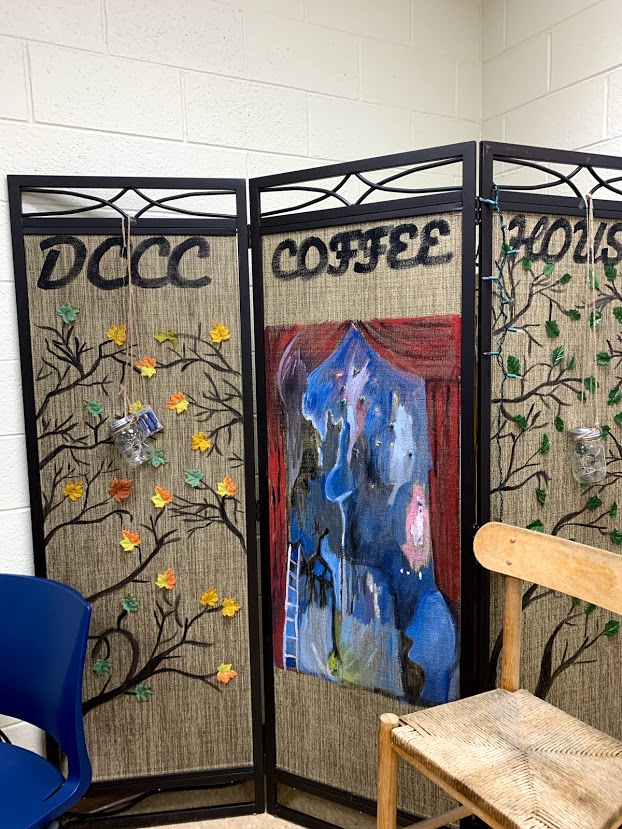
When former president Mary Rittling arrived at the school in 2003, she started talking to people about developmental education. She soon learned that it wasn’t working at DDCC. “How we were placing students was a real mess,” said Rittling.
Davidson-Davie Community College became one of nine schools in Completion by Design, an initiative funded by the Bill & Melinda Gates Foundation that focused on efforts to significantly boost student progression and success. “It really caused us to disaggregate the data and figure out what was going on with the student population,” Rittling said.
Soon after, DDCC embarked on a redesign of developmental education that wasn’t just about placement and curriculum, it was a philosophical shift — a changing of mindsets. Rittling hated the word developmental. “The word itself is negative. It doesn’t give any asset, inspiration, or desire,” she said.
In 2015, Davidson-Davie Community College developed the College Transition Center. “[DDCC] made a commitment that these students would get additional support … They would be successful, and we would support them,” she said.
The Transition Center isn’t just focused on a student’s ability to pass a course. It is much more holistic. “You realize there are other components that were the psycho-social components that [students] needed as well,” Rittling said. “If you didn’t address all of that, students probably wouldn’t be successful.”
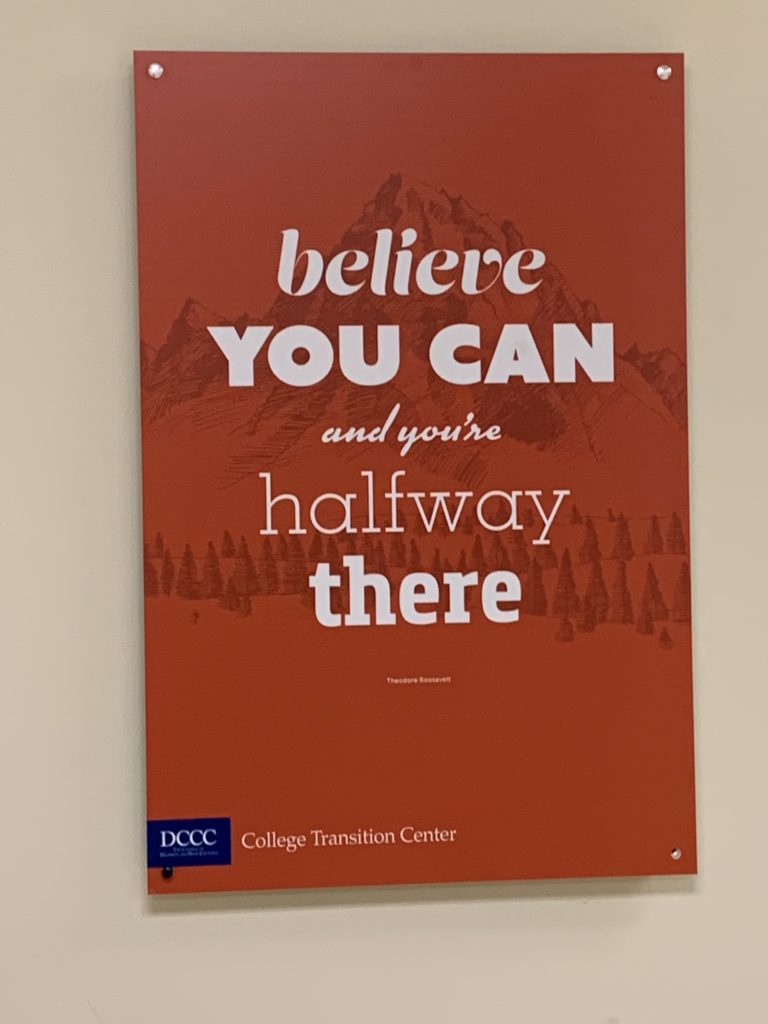
Part of their holistic approach was hiring the right faculty. “A faculty member may know the discipline, but are they comfortable, do they have the tools to teach students who need more?” Rittling said.
Susan Huneycutt, now the dean of arts, sciences, business, and technology at DDCC, became director of the Transition Center in 2015. Huneycutt is a former K-12 math teacher, principal, and assistant superintendent. Because of her previous roles, she knew the type of faculty members she needed for the Transition Center. “I looked for folks who were very student success driven … faculty members the students would relate to,” she said.
The design of the Transition Center supports their approach as well. Inspirational quotes painted in bold colors fill the walls. “Rittling’s vision was to make the Transition Center an inviting, wonderful space for students who needed it most when they entered campus — to have the feeling that they belonged,” said Huneycutt.
Seeing success
From the very beginning, students in the Transition Center saw success. When the center started, the developmental courses were divided into modules after a statewide redesign. For math module 010, the success of students rose 90%. And for math module 020, generally a more difficult module for students that included decimals and fractions, the passage rate went from 49% to almost 90%. They also discovered that students in the Transition Center not only finished, but finished quicker. “We had some students finish three modules in eight weeks,” Huneycutt said.
The success of the Transition Center at DDCC gained national attention, receiving recognition from Achieving the Dream, a national organization championing evidence-based institutional improvement. The Transition Center team was invited to present at multiple events, including one hosted by the American Association of Community Colleges.
In the spring of 2019, DDCC joined the second group of North Carolina community colleges to pilot a new developmental education model called RISE. This meant a move away from the module courses they were using towards what they now call transition courses. In the transition courses, students log onto a platform called NROC and move through various math and English units at their own pace, asking for help from instructors when they need it.
EdNC visited Davidson-Davie Community College’s Transition Center in November 2020. Huneycutt and the new Transition Center director, Londa Pickett, shared their personal experiences working alongside instructors and the transition to RISE. Despite the challenges of moving to a new model, both Pickett and Huneycutt say the shift to RISE has been positive.
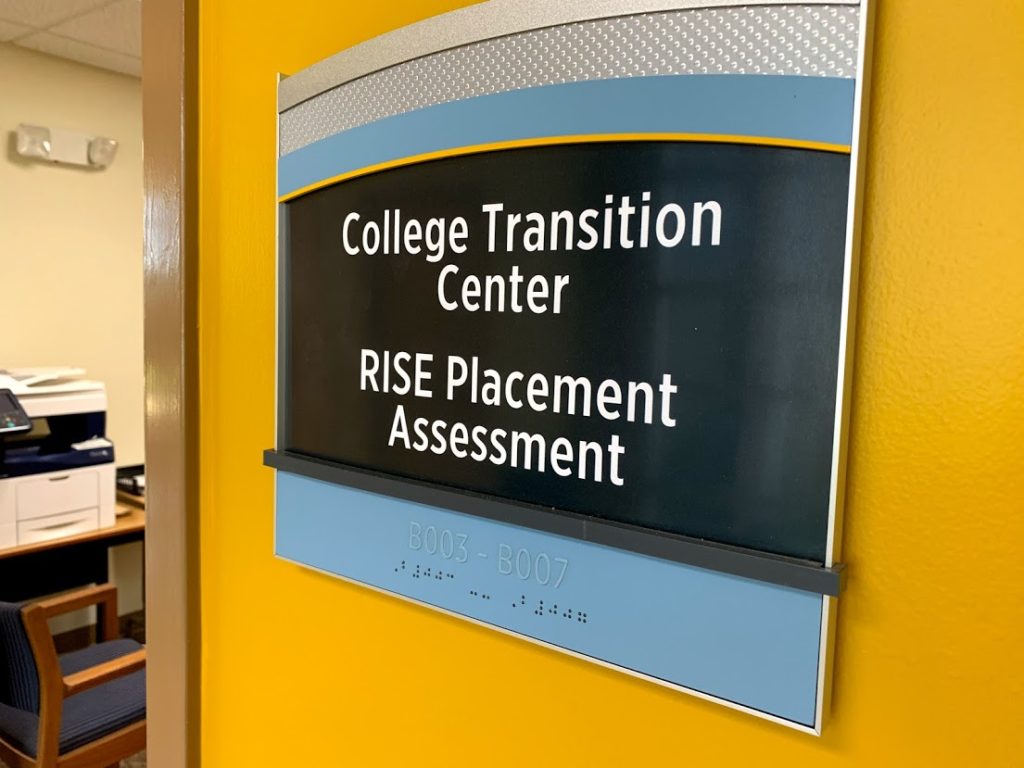
RISE and the Transition Center
Megan Brown’s childhood wasn’t an easy one. Filled with trauma and high school years spent couch surfing and finding her way to friends’ dinner tables, she did whatever she could to survive.
“I remember being someone that always needed validation, and with not having that as a child and teen, it caused me to not care much about school or my future,” Brown said.
When Brown decided to enroll at Davidson-Davie Community College, she was placed in the transition English course. During the course, Brown had to write something personal about herself and chose to write about her childhood experiences.
“The assignment was hard, but I did it, and it was good just to actually get it out,” she said. Brown credited her instructor, Sandy Tucker, for helping her put a different mindset on how she approaches things.
And the class, well, “It makes you think about things you don’t normally think about,” she said. “You’re getting out on paper and you’re learning how to write, but you also have the opportunity to change how you think about something just from writing an essay. The essays have helped me sit down and talk to my husband about things and given me a starting point.”
Brown’s husband is the one who pushed her to continue her education so that she could finally do something she enjoyed.
“Going back to school sparked something in me,” Brown said. “Although it took me two years to agree to go back just because I didn’t believe in myself … I am thankful. These last few years have been the most important years of my life! Having teachers that also help teach life lessons, it almost feels like I’m learning to grow up at 27 years old. I appreciate everything my teachers have done and I wouldn’t have wanted any other teachers.”
Both Marva Toney and Kendall Coleman, transition English students, said the classes helped them remember a lot of information they had forgotten. “If I am reading something, I’m even catching myself correcting other people’s writing,” Coleman said.
During the visit, I met with Sterling Charles, a transition math instructor. Charles was in the middle of working out a problem for one of his students, but stopped to explain the growth mindset activity for the week.

A different quote is given to students each week, and they are required to reflect on what the quote means to them. As Charles explained, “It doesn’t have to necessarily be about math. It can be about anything in their life.” The students in Charles’ class appreciate activities that make them think outside the box.
Perhaps most important is that no matter the redesign, whether it’s RISE or the module classes from the previous model, the mission of the Transition Center has remained the same: “Create a positive, supportive environment in developmental education that prioritizes an individualized response to every student, regardless of previous education or ability level.”
Before leaving campus, I walked the halls of the Transition Center. Paying attention to each of the quotes, I noticed one that looked more worn. “Oh yeah,” said Pickett. “Students seem to love that one. Looks like some have even tried to take it home with them.”
The banner reads:

This article is part of a series looking at developmental education and RISE in North Carolina. For the rest of the series, click here. In the final article, we will look at what’s next for RISE.
Behind the Story
Molly Osborne and Emily Thomas reported and wrote this series. Analisa Sorrells, Eric Frederick, and Mebane Rash edited it.
Over the course of four months, we interviewed five North Carolina Community College system office staff, 10 former or current community college presidents, 18 community college administrators, 14 faculty members, 14 students, one Department of Public Instruction administrator, and nine community college researchers and national experts.


